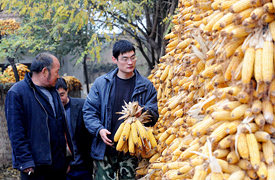|
 |
 |
|
FIRSTHAND INFORMATION: Wen Zhen analyses the corn crop in Huzhai Vilalge, Lankao County in Henan Province (ZHU XIANG) |
BUSINESS MINDED: Cheng Guangjing in Dongzhuang Village, Lankao County in Henan Province, visits a local vegetable greenhouse (FILE) |
While most fresh university graduates in China aim to find jobs in the cities, more and more well-educated young people are starting to look for career opportunities in rural areas.
Cheng Guangjing is one of those who have chosen to work as a village official. In 2009 he began working in Dongzhuang Village, Lankao County in central China's Henan Province. On November 24, 2011, the villagers unanimously elected him secretary of the Dongzhuang Committee of the Communist Party of China (CPC).
According to Xinhua News Agency, at present, approximately 200,000 college-graduates like Cheng are working as village officials in China. Of them, 159,000 assumed office after March 2008.
To improve the quality of governance at the rural level, various tiers of government in China have launched programs to attract college-educated people to work as village officials.
Some provinces such as Jiangsu and Hainan initiated such programs in the late 1990s. More provincial governments began to recruit college graduates as village officials after July 2005, when the Central Government issued a circular encouraging college graduates to work in the countryside.
In 2008, the Central Government announced it would select 100,000 college graduates to work as village officials over the next five years. These college graduates were expected to work for two to three years in their assigned positions, and they are paid a monthly allowance.
As part of reforms to the civil service recruitment exam in recent years, the country has reserved vacancies for college graduates who have already worked as village officials, workers and farmers, and the number is increasing.
At the end of last year, a new civil service recruitment policy was issued, stipulating that central and provincial governments will recruit new civil servants mainly from applicants with at least two years of lower-level governmental work experience from 2012.
"The new policy is a change in the strategy for cultivating fresh college graduates. And it will encourage them to seek jobs in lower-level governmental departments and in remote regions," said Wang Yukai, a professor at the Chinese Academy of Governance.
The programs to recruit college graduates as village officials are also expected to alleviate the employment pressure for college graduates. China has drastically expanded college enrollment since 1999. As a result, college graduates now face fierce competition in the job market, and finding satisfactory jobs in cities is increasingly difficult.
Born to a farming family in Henan Province in the mid-1980s, Cheng also once aspired to move to a major city. When he was a child, his mother told him to study hard and go to university, because under China's household registration system that was virtually the only way he could avoid being consigned to a lifetime in the farmland.
Cheng succeeded in going to university, and after graduation, he found a teaching job at the Shanghai University of Engineering Science. His parents were thrilled that their son would have a career in a large city, free from the toil of a rural farming existence.
But in December 2008, upon learning that his home province, Henan, was recruiting college graduates to serve as village officials, Cheng applied. He wanted to return to the area of his birth and do something for his fellow countrymen with the knowledge he had gained at university.
Cheng passed the screening and was appointed deputy Party chief of Dongzhuang, which was not far from his birthplace.
With more than 2,000 residents and little arable land, Dongzhuang was a poor village. After assuming office, Cheng visited all the village's households and tried to learn what he could do for each family.
Upon learning that some villagers wanted to build greenhouses and grow vegetables but lacked relevant knowledge and funds, Cheng set out to obtain the requisite funds and technology. Eventually he raised more than 600,000 yuan ($92,000) seed money, which allowed villagers to build greenhouses. He also hired experts from Shouguang, China's largest vegetable wholesale center in Shandong Province, as technical instructors.
Using government subsidies for graduates who become village officials business endeavors and his personal savings, Cheng himself also built two greenhouses and a seedling nursery that allowed him to provide local villagers with high-quality seedlings free of charge.
So far, 36 greenhouses have been built in Dongzhuang, covering a total area of 7.5 hectares and 20 impoverished households have significantly increased their incomes by growing greenhouse vegetables.
| 